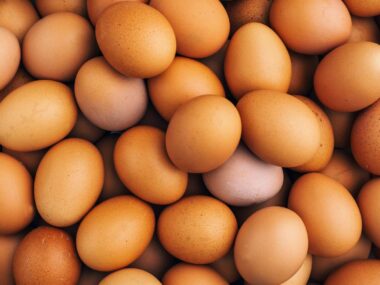Beans are a various and nutritious class of legumes which have been a staple in diets all over the world for hundreds of years. They arrive in varied shapes, sizes, and colours, and so they provide a variety of well being advantages.
Sorts of Beans
- Frequent Beans: These embody varieties like kidney beans, pinto beans, black beans, and navy beans.
- Lentils: Crimson, inexperienced, and brown lentils are standard choices.
- Chickpeas: Also called garbanzo beans, they arrive in varied kinds, together with small desi chickpeas and bigger kabuli chickpeas.
- Soybeans: Soybeans are used to make merchandise like tofu, tempeh, and soy milk.
- Black-Eyed Peas: Usually utilized in Southern delicacies and have a particular black spot on their floor.
- Adzuki Beans: Small, crimson beans usually utilized in Asian desserts.
- Cannellini Beans: Giant white beans generally utilized in Italian delicacies.

Dietary Advantages
- Excessive in Protein: Beans are a wonderful supply of plant-based protein, making them an essential meals selection for vegetarians and vegans. Protein is crucial for muscle progress, restore, and general physique operate.
- Wealthy in Dietary Fiber: Beans are filled with dietary fiber, each soluble and insoluble. This fiber content material helps in a number of methods. Fiber aids in common bowel actions and prevents constipation.
- Blood Sugar Management: It helps regulate blood sugar ranges by slowing down the absorption of sugar.
- Weight Administration: The sensation of fullness from fiber might help management urge for food and scale back overeating.
- Low in Fats: Most beans are naturally low in fats, making them a wholesome addition to your weight loss program, particularly if you happen to’re attempting to handle your fats consumption.
- Complicated Carbohydrates: Beans present advanced carbohydrates, that are a gradual and regular supply of vitality. They assist keep steady blood sugar ranges and supply sustained vitality all through the day.
- Nutritional vitamins and Minerals: Beans are wealthy in important vitamins, together with:
- Folate: Vital for cell division and the formation of DNA.
- Iron: Mandatory for transporting oxygen within the blood.
- Magnesium: Vital for muscle and nerve operate, bone well being, and vitality manufacturing.
- Potassium: Helps regulate blood stress and fluid stability within the physique.
- B nutritional vitamins: Resembling thiamine (B1), riboflavin (B2), and niacin (B3), that are essential for metabolism.
- Antioxidants: Beans include varied antioxidants, together with flavonoids and polyphenols, which assist defend cells from harm brought on by free radicals. Antioxidants are related to a diminished threat of power ailments like coronary heart illness and most cancers.
- Lowered Threat of Continual Illnesses: Common consumption of beans has been linked to a decrease threat of a number of power ailments, together with coronary heart illness, diabetes, and sure forms of most cancers, largely resulting from their fiber, nutritional vitamins, minerals, and antioxidants.
- Weight Administration: Resulting from their excessive fiber and protein content material, beans can promote emotions of fullness and satiety, which can assist with weight administration and weight reduction when included right into a balanced weight loss program.
- Intestine Well being: The fiber in beans acts as a prebiotic, offering nourishment for useful intestine micro organism. A wholesome intestine microbiome is related to improved general well being.
- Sustainable Protein Supply: Beans have a comparatively low environmental influence in comparison with animal-based protein sources, making them an eco-friendly selection for these involved about sustainability.
Culinary Makes use of
- Beans can be utilized in quite a lot of dishes, together with soups, stews, salads, and casseroles.
- In some cultures, they’re a major protein supply, like in Mexican chili, Indian dal, or Center Jap hummus.
- They are often mashed and used as a filling for burritos or tacos.
- Roasted chickpeas make a scrumptious and wholesome snack.
- Bean sprouts, usually grown from mung beans, are utilized in salads and stir-fries.
Cultural Significance
- Beans have cultural significance in lots of components of the world. For instance, within the Southern United States, black-eyed peas are historically eaten on New 12 months’s Day for good luck.
- In Mexico, beans are a elementary a part of the delicacies, utilized in dishes like refried beans, bean soups, and burritos.
- In India, varied forms of lentils and beans are a staple in vegetarian diets and are utilized in dishes like dal and sambar.
Well being Concerns
- Whereas beans are nutritious, some individuals could expertise fuel and bloating resulting from their excessive fiber content material. Soaking beans earlier than cooking and cooking them completely might help scale back these results.
- Beans could be a part of a nutritious diet, however portion management is essential as they’re comparatively calorie-dense.
- For these with sure dietary restrictions or allergic reactions, beans could be a priceless protein supply.
Sustainability
- Beans are thought-about environmentally pleasant as a result of they’ve a decrease carbon footprint in comparison with some animal-based protein sources.
- They are often grown in quite a lot of climates and are sometimes utilized in crop rotation to enhance soil high quality.
As well as, Beans are a flexible and nutritious meals supply with a wealthy cultural historical past. They provide quite a few well being advantages and could be a priceless a part of a balanced weight loss program.
Whether or not you get pleasure from them in a hearty stew, a flavorful curry, or a easy salad, beans are a culinary staple price exploring additional.
In abstract, Beans are a dietary powerhouse, providing a variety of well being advantages resulting from their spectacular nutrient profile. including quite a lot of beans to your weight loss program can present a big selection of vitamins and well being advantages.










